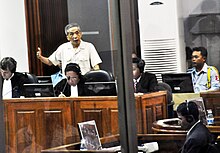
Back Khmer Rouge Afrikaans الخمير الحمر Arabic Khmeres Roxos AST Qırmızı khmerlər Azerbaijani Ҡыҙыл кхмерҙар Bashkir Khmer Rouge BCL Чырвоныя кхмеры Byelorussian Червени кхмери Bulgarian খেমার রুজ Bengali/Bangla Crveni Kmeri BS



The Khmer Rouge (Khmer: Kmae Krahaam; French for "Red Khmer") was a Marxist–Leninist militant group in Cambodia. They took over Cambodia in 1975 and lost power in 1979. Under the Khmer Rouge, Cambodia became a totalitarian state. The Khmer Rouge committed the Cambodian genocide,[1] killing as many as 3,000,000 (1⁄3 of the Cambodian population).[1]
- ↑ 1.0 1.1
- Hinton, Alexander Laban (1998). Why Did You Kill?: The Cambodian Genocide and the Dark Side of Face and Honor. Cambrdige University Press. Retrieved December 10, 2024.
Published online by Cambridge University Press: 26 March 2010
- Hannum, Hurst (2001). "International Law and Cambodian Genocide: The Sounds of Silence". Cambodia (1 ed.). Routledge. ISBN 9781315192918. Retrieved December 10, 2024.
- Kiernan, Ben (2012). "The Cambodian Genocide, 1975–1979". Centuries of Genocide (4 ed.). Routledge. ISBN 9780203867815. Retrieved December 10, 2024.
- Tyner, James A.; Henkin, Samuel; Sirik, Savina; Kimsroy, Sokvisal (January 1, 2014). "Phnom Penh during the Cambodian Genocide: A Case of Selective Urbicide". Sage Journals. 46 (8). doi:10.1068/a130278p. Retrieved December 10, 2024.
- Tyner, James A. (January 18, 2014). "Dead labor, landscapes, and mass graves: Administrative violence during the Cambodian genocide". Geoforum. 52. Ohio, USA: 70–77. doi:10.1016/j.geoforum.2013.12.011. Retrieved December 10, 2024.
- Hinton, Alexander Laban (1998). Why Did You Kill?: The Cambodian Genocide and the Dark Side of Face and Honor. Cambrdige University Press. Retrieved December 10, 2024.